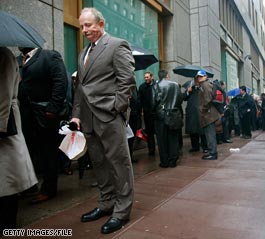When Panasonic President Fumio Ohtsubo said in early November that the company was interested acquiring mid-sized tech manufacturer Sanyo Electric, he envisioned finalizing the deal by late December (BusinessWeek.com, 11/7/08). The path to forming a tech giant with $110 billion in annual revenues seemed clear-cut: Panasonic would start by buying out Sanyo's three biggest investors (BusinessWeek.com, 11/6/08)—Goldman Sachs (GS), Daiwa SMBC Capital and Sumitomo Mitsui Banking—for their combined 70% stake.
But that's not how things are playing out. On Nov. 26, after nearly three weeks of discussions, Goldman Sachs said it had rejected Panasonic's offer earlier in the week and walked out of the talks. "We didn't agree on the price and the deal structure," says Goldman Sachs spokeswoman Miyako Takebe in Tokyo.
Panasonic was offering 120 yen for each Sanyo share, according to Daiwa SMBC and other sources. That's roughly $7.8 billion, or three times the $2.6 billion that Goldman, Daiwa, and Sumitomo Mitsui coughed up for their Sanyo stakes in January 2006, less than three years ago.
Daiwa SMBC left the door open
Still, the offer was 23% below Sanyo's stock price at the close of trading on Nov. 25. (Sanyo stock lost 3.9% Nov. 26.) And it fell far short of the 250 yen per share that Goldman wanted, according to the Yomiuri Shimbun and financial daily Nikkei newspapers.
Among Sanyo's trio of key investors, Goldman was the only one to break off talks. While Daiwa SMBC also dismissed Panasonic's offer as too low, the difference was that Daiwa spokesman Kenichi Kanda didn't rule out more discussions in the future. (Sumitomo Mitsui and Panasonic both declined to comment.)
Panasonic is eager to add Sanyo's expertise in two areas—batteries and solar panels. Sanyo is the largest global supplier of rechargeable batteries for laptops, cameras, mobile phones, and other portable gizmos. It's also the world's seventh-biggest manufacturer of solar cells. Together, the two companies would have a strong portfolio of green technologies, giving them an edge in developing new batteries for hybrid and electric cars and solar energy equipment for homes and offices.
First, however, Panasonic must negotiate a compromise with Sanyo's investors. A key reason for the dispute stems from the two sides' differing views about how to value the 430 million Sanyo preferred shares held by the three key investors. Each share will be convertible to 10 common shares as of mid-March 2009. Added together, the 4.3 billion shares would account for 70% of Sanyo's stock.
Sumitomo Mitsui Favors the deal
According to sources close to the talks, Panasonic wants the price to reflect the reduction in value of each Sanyo share after such a stock conversion took place. For its part, Goldman is said to contend that Sanyo's current share price already reflects that dilution. The truth lies somewhere in the gray zone between the two claims, says Macquarie Securities analyst David Gibson, who has done the math. "The market has not [fully] factored in the dilution from the preferred shares," Gibson says.
Without Goldman's cooperation, Panasonic would have to woo the remaining two. Getting Sumitomo Mitsui Banking on its side shouldn't be a problem. Apart from being a major shareholder, Sumitomo Mitsui Banking is also Sanyo's main creditor. It has said its top priority is finding a buyer that can help Sanyo pay back the loans, according to someone with knowledge of the discussions between Panasonic and Sanyo. Indeed, it was a top Sumitomo Mitsui Banking Group executive who set up the first secret meetings between the heads of Panasonic and Sanyo a couple of months ago, says this person.
Panasonic might try to lure Daiwa by sweetening the offer a bit. If Daiwa agrees, then what? Panasonic would still face a battle if it asks all Sanyo shareholders to vote on the matter, although it's too early to know whether this might happen and whose side ordinary shareholders would rally behind. The uncertainty has hurt Panasonic's shares, which fell 2.7% on the news—a bigger drop than that sustained by the Tokyo Bourse's electrical machinery index, which slid 1.4%.
By Kenji Hall and Hiroko Tashiro
Hall and Tashiro cover Japan's corporate sector from BusinessWeek's Tokyo bureau .



